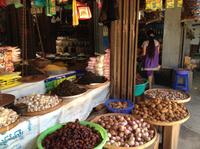Rural Myanmar and Pottery Tour from Yangon
Yangon, Republic of the Union of Myanmar
Rating: 









Trip Type: Walking Tours
Duration: 5-6 hours approx.
Leave Yangon on a 5- to 6-hour tour that takes you to the potter artisans of Twante and the Shwesandaw Pagoda and provides a taste of rural Myanmar along the way. With a knowledgeable guide, catch the ferry from the city and travel along the Twante Canal. Stop at traditional pottery workshops and try your hand at working with clay, and then walk up to Shwesandaw Pagoda to soak in breathtaking views. Relax over lunch at a local restaurant, and browse the local market before hopping back on the ferry.
More About This Activity All Walking Tours →
Leave Yangon on a 5- to 6-hour tour that takes you to the potter artisans of Twante and the Shwesandaw Pagoda and provides a taste of rural Myanmar along the way. With a knowledgeable guide, catch the ferry from the city and travel along the Twante Canal. Stop at traditional pottery workshops and try your hand at working with clay, and then walk up to Shwesandaw Pagoda to soak in breathtaking views. Relax over lunch at a local restaurant, and browse the local market before hopping back on the ferry.
In the morning, meet your guide at a central meeting point in Yangon, and take a short walk to the river to catch the public ferry.
The 10-minute ferry ride on the Twante Canal provides an excellent opportunity to glimpse daily life on the water, with photo ops galore. You might see small wooden boats where fishermen haul in their catches, larger boats transporting cargo to the city and kids playing in riverside villages.
When you disembark, take either a private taxi or truck taxi through the countryside to the town of Twante, which is known for its pottery. Stop by local artisans' workshops to see their crafts and observe how they work with traditional tools and kilns. If you wish, you may participate in a hands-on lesson in traditional pottery methods.
Next, walk uphill with your guide for about 20 minutes to reach Shwesandaw Pagoda, a 250-foot (76-meter) stupa that is said to be 2,500 years old. A 100-year-old Mandalay-style bronze Buddha statue sits inside, along with several other Buddha statues.
You have probably worked up an appetite by now, so head to a popular local restaurant that specializes in vegetarian cuisine, and tuck into a tasty lunch. Afterward, you have time to explore the local market with your guide who shares informative commentary about the people and history of the area.
After a stroll around town, return to the ferry to head back to Yangon. As you cruise along the river, your guide points out notable landmarks until you reach the dock in Yangon, where your tour ends.
The 10-minute ferry ride on the Twante Canal provides an excellent opportunity to glimpse daily life on the water, with photo ops galore. You might see small wooden boats where fishermen haul in their catches, larger boats transporting cargo to the city and kids playing in riverside villages.
When you disembark, take either a private taxi or truck taxi through the countryside to the town of Twante, which is known for its pottery. Stop by local artisans' workshops to see their crafts and observe how they work with traditional tools and kilns. If you wish, you may participate in a hands-on lesson in traditional pottery methods.
Next, walk uphill with your guide for about 20 minutes to reach Shwesandaw Pagoda, a 250-foot (76-meter) stupa that is said to be 2,500 years old. A 100-year-old Mandalay-style bronze Buddha statue sits inside, along with several other Buddha statues.
You have probably worked up an appetite by now, so head to a popular local restaurant that specializes in vegetarian cuisine, and tuck into a tasty lunch. Afterward, you have time to explore the local market with your guide who shares informative commentary about the people and history of the area.
After a stroll around town, return to the ferry to head back to Yangon. As you cruise along the river, your guide points out notable landmarks until you reach the dock in Yangon, where your tour ends.
« Go Back

